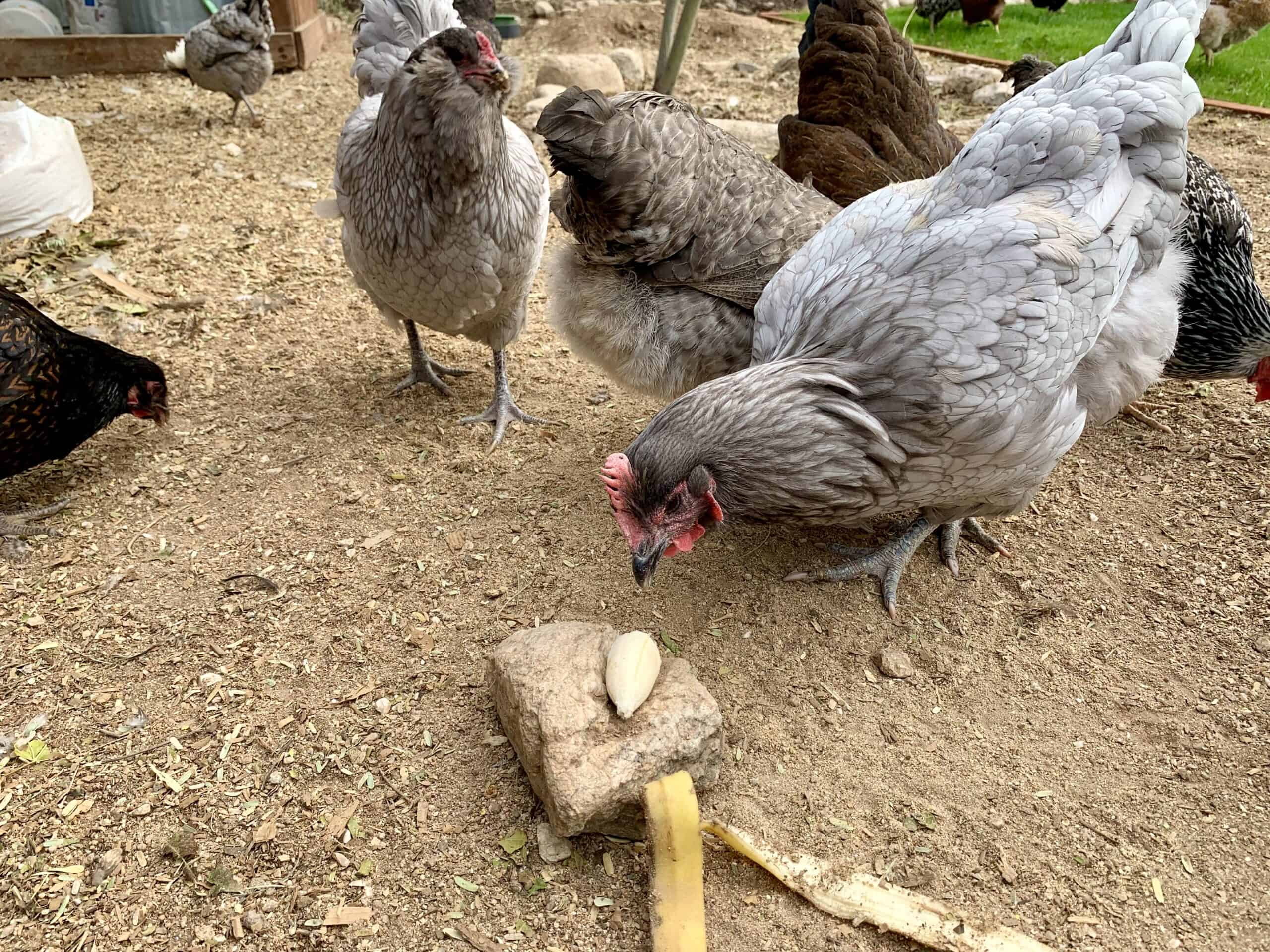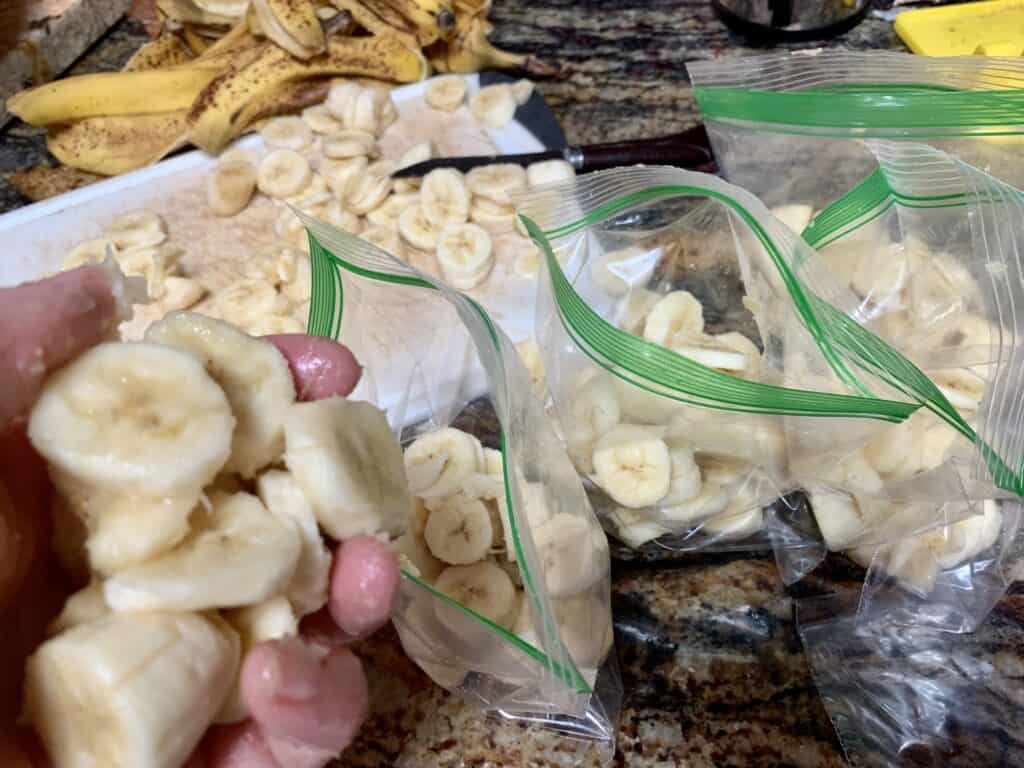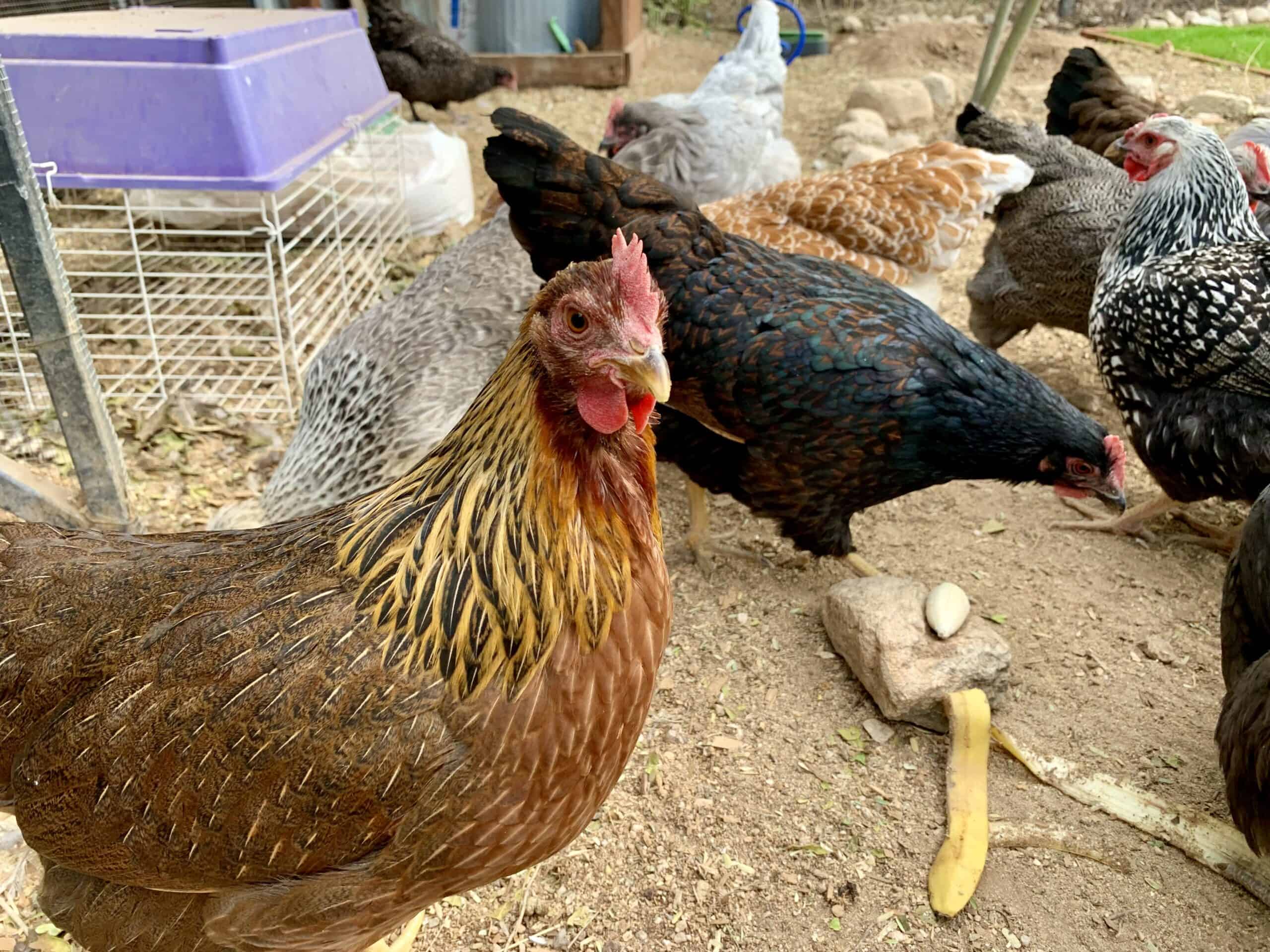Can chickens eat bananas? Yes, they can. Chickens can also eat banana peels. In moderation, bananas are safe for your flock. Before feeding chickens bananas for the first time, there are a few different things you can do.
The first time you give them a banana, you may want to peel it, set the banana down, and see what happens. You can leave it whole or chop it into pieces. It is fun to watch. You’ll really see each of your chicken’s personalities shine through. Some will be curious, others will curious but cautious, and others will take the lead on it and will be the first to get a taste.
Now that my chickens eat bananas, and they are no longer new, I chop the bananas up into pieces. I spread them around and almost hand them to the shyer hens. Depending on the size of the banana, I typically chop it up into 6 – 8 pieces.
Sharing Bananas Among Your Flock
I like each hen getting a piece so I chop accordingly so there’s enough to go around. I buy bananas for my family, not my chickens, so they will usually only get one, if any. We give them all of our banana peels which is a treat unto itself.
Cutting the bananas and spreading them around gives all the chickens a chance of having some. This enables even the least dominant hens to get their share. Give bananas to chickens like you would other treats: in moderation.
You can give chickens banana peels as well. However, they will likely only eat the inside that was facing the banana. They will peck at it and eat that down to the harder skin. Most chickens and roosters won’t find the hard skin appealing.
Depending on how many banana peels I have, I usually chop the peels so all the hens can enjoy them. Otherwise, my two most aggressive chickens at the top of the pecking order will take the peels and do their best to run off and keep it for themselves.
It’s a lot easier for them to run off with banana peels than with whole bananas!
Keep reading about if chickens eat bananas and some creative ways to give them the fruit and the peel.
Can Chickens Eat Bananas
Your chickens can eat bananas, and they will likely love them. Typically though, I only give my chickens the peels. My family eats lots of bananas each week. Us humans eat the bananas we pay for. However, if I have a lot going bad, and I don’t want to make banana bread or freeze them for smoothies, I will give them to my chickens.

It makes sense you may want to give your feathered friends these fruits. Bananas are affordable and readily available.
Also, we humans don’t eat the banana peels. Rather than tossing them in the trash or composting them, it makes sense to want to feed them to your chickens.
Can Chickens Eat Banana Peels
The great news is Yes! Chickens can eat banana peels. You can give them the whole peel or chop it up. Like with the fruit, dominant hen may take over so slice them into strips so all your hens can peck at their leisure.
Chickens may peck at the inside peel but won’t consume the peel itself. Many hens won’t be interested in the peels at all. See what works for your flock.
If you toss the peels on the ground where they free range, the peels will become dirty. After a few hours or if when it seems the hens have lost interest, I will toss the dirty peels in the compost or garbage. This avoids attracting ants and mice.
Should You Wash Banana Peels Before Feeding Them to Chickens
If you find your flock is eating the peel itself and not just the inside where the banana grew, it’s good to wash the peel before giving it to the chickens. This will help remove pesticides and chemicals.
Pesticides and chemical treatments are a concern. Fruits, including bananas, are often sprayed with various chemicals and pesticides during storage, which tend to accumulate in the peel. These substances can linger on the peel.
If your chickens are like mine though, you’ll see them just pecking at the inside of the peel to access where the banana fruit was. Then, you don’t need to wash the peels.
Feeding Chickens Banana Peels
I love that I can give chickens banana peels, and they can eat what they can from it. Then, along with other rinds and skins from other fruits, I toss them in the compost pile or garbage.
Note: When I just had a compost tumbler and not an out-in-the-open compost pile, I didn’t add the used banana peels to the compost tumbler. I didn’t add anything with chicken manure or anything to it.
However, I now toss the thrashed-around banana peels in my compost heap without concern. This was just a personal preference when I had only the tumbler.
How to Feed Bananas to Chickens
It’s really easy for chickens to eat bananas. Here’s how to feed them.
Option 1: Sliced banana
- Peel banana and remove the fruit.
- Chop the fruit into pieces so all the chickens and roosters can get some.
- Spread them out to your flock.
You can also put wholly intact bananas out for them. This may or may not cause fighting and negative behaviors; you know your flock better than anyone to decide what is right for them.
Option 2 (aka the fun way): Hanging banana
- Make a few slits in the banana lengthwise.
- Get twine, yarn, or string, and tie it securely to the top of the banana.
- Hang it somewhere where the chickens can access it like you would a treat ball.
If it is too difficult to secure twine and hang the banana, carefully take a knife and make a hole in the top of the banana (right under the main stem), and thread twine through it.
Hanging an intact banana or two or three is a fun way to keep your chickens busy and occupied. Like with chicken toys or chicken swings, it’s a way for them to be engaged and mentally stimulated. Depending on the size of your flock, you may want to hang a few bananas.
Option 3: Mashed banana
- Remove the peel and break about the banana.
- Mash it with a fork.
- Set in a small throwaway container (or several to avoid fighting).
Option 4: Sliced and frozen
- Remove the peel and slice the bananas in circles.
- Put slices in a freezer safe plastic bag or container, removing the air.
- Feed frozen banana slices to chickens on a hot summer day.
Option 5: Open the banana and give it whole
- Peel the banana so the fruit is visible
- Set it down or hand feed it to your chickens
How to Feed Banana Peels to Chickens
There are three ways you can do this. They all will add some interest and variety to your chicken’s day.
First way:
- Cut the peels the long ways and give a slice to each hen.
- Or chop them lengthwise into smaller pieces as if you were cutting a banana in circles (but do it with the peel).
Second way:
- Give each chicken its own peel which will keep them busy for awhile.
Third way:
- See above where I explain how to hang it. You can hang the entire banana or just the peels.
Can Chickens Eat Moldy Bananas
No, chickens shouldn’t eat moldy bananas. Feeding moldy bananas to chickens is not advisable.
Can Chickens Eat Brown Bananas
Yes, chickens can eat brown bananas. Overly ripe bananas are fine but they shouldn’t be spoiled. As long as you would use them to make banana bread or in smoothies, you can feed brown bananas to chickens. If they don’t smell like bananas, don’t give them to your chickens.
Can Chickens Eat Unripe Bananas
Chickens can eat unripe, green bananas, but they may not be as interested in them as they would be in ripe bananas. Green bananas are less sweet and have a firmer texture, which could make them less appealing to chickens.
Don’t give chicks bananas that are unripe.

Can Chickens Eat Frozen Bananas
Yes, chickens can eat frozen bananas. They will likely enjoy them on hot summer days. It’s also a great way to preserve bananas before they become rotten. So you can give your chickens the banana peels and save the bananas for another day.
I chop bananas and freeze them in plastic bags. This makes it convenient to bring it out to the chickens when it’s hot.
You can also thaw the bananas overnight or on the countertop, and give them to your flock in a bowl.
Personal Thoughts
My opinions on this are:
- I provide my chickens with free-ranging options and their chicken feed; they don’t “need” bananas as treats but they enjoy them
- You will need to pick up the peels after a day or so and discard them. You don’t want them to attract ants and rodents. This adds to your workload.
- I chop and freeze the bananas and peels and give them sparingly.
- Sometimes I make it fun for them (instead of just tossing it to them) adding to their activity and stimulation.
- Humans don’t eat the peels so it’s a great use of them instead of throwing them away.
- It’s a great use for bananas that your family won’t be able to eat.
Can Chickens Eat the Actual Banana Peels or Just the Insides
While chickens can eat banana peels, it’s worth noting that the peels are not as easily consumed as the fruit itself. Banana peels are tough, which can be difficult for chickens to digest. However, if the peels are cut into smaller, more manageable pieces, chickens will likely eat them. It really depends on each individual hen.
More prep work: Clean the peels
If you decide to feed banana peels to your chickens and you see they are actually eating the harder peel and not just the inside where the fruit touched it, make sure to clean them thoroughly.
Bananas are often treated with pesticides and chemicals. Also be sure to cut them into smaller pieces to make it easier for the chickens to eat.
Will Chickens Eat Bananas
Yes, your flock of chickens will probably love eating bananas… most of my hens do. It’s likely they will like the taste and the novelty of having something new.
Bananas can also serve as a fun source of enrichment for them, especially when the fruit is hung up for them to peck at leisurely.
Guidelines for Feeding Bananas to Chickens
Leftover bananas are fine from time to time but consider bananas as treats for chickens. Their regular diet has to be a priority!
Bananas should be given to chickens sparingly and not on a daily basis. A single banana is typically sufficient for a flock of 6 – 10 chickens. Break it apart and distribute it so they all get some.
Instead of giving them a whole banana, break it apart and distribute it so they all get some. By scattering them around, you allow all the birds to partake. This prevents the dominant chickens from monopolizing the treats.
Consider slicing and freezing bananas to serve as a refreshing treat during the hotter months. Learn other ways to keep chickens cool in the summer. Freezing them also keeps them fresh so they don’t go bad and moldy.
Another fun way to introduce bananas is by hanging them up, providing an engaging activity for the entire flock.
Potential Issues with Chickens Eating Bananas
Feeding bananas to chickens isn’t without some issues. Chickens might scatter the banana, leading to sticky feathers. This experience might be unique to my flock, however.
After eating bananas, you might notice chickens scraping their beaks on the ground. This behavior sometimes happens when chickens eat soft, mushy fruits, as they prefer to keep their beaks clean.
Sugar in Bananas
According to the USDA, on average, one cup of sliced raw banana (150 grams), approximately the size of a single banana, contains 18.3 grams of sugar and 32.4 grams of carbohydrates.
For a chicken, this can represent a significant portion of their daily sugar intake. Experts suggest that chickens should consume no more than 5 – 10% of their diet in the form of sugar, with the remaining balance consisting of carbohydrates and protein.
FAQs
Can chickens eat bananas or banana peels?
Yes, chickens can eat both bananas and banana peels. They are safe for chickens in moderation. Be sure to give fresh, ripe bananas. Frozen are fine too. They shouldn’t be moldy but it’s okay if the bananas are brown or not perfectly ripe.
Chop up the banana into pieces so all the hens get their fair share. Or you can hang an entire banana (like you would a treat ball), and your flock will have fun pecking at it.
Chickens and roosters can eat banana peels but will likely most enjoy the inside of the peel where the fruit touched. I chop up the peels and the bananas so they can all have fun and so no chicken is eating too much.
Can chickens eat brown bananas?
Yes, like with yellow bananas, chickens can eat brown bananas in moderation. However, be sure the brown bananas are simply overripe but aren’t moldy. If you would use them to make banana bread, you can feed them to your chickens.
How do you feed bananas to chickens?
To feed bananas to chickens, start by peeling the banana and offering the soft flesh. Cut it or break it into enough pieces so all your chickens get some. If you wish to feed the peel, ensure it’s cut into smaller, manageable pieces.
Is it good for chickens to eat banana peels?
Banana peels can be consumed by chickens. It’s likely your chickens won’t actually eat the hard peel but more the softer side where it’s sweet.
Can Chickens Eat Bananas… Yes, They Can!
Some of your hens will likely be curious enough to investigate the treat!
Keep reading:
Featured image credit for Can Chickens Eat Bananas: Dawn Head

